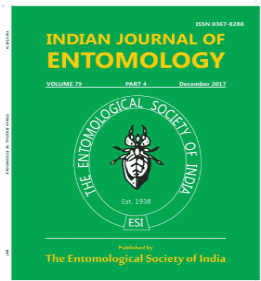Damage and Oviposition of Tea Mosquito Bug Helopeltis antonii Signoret on Guava, Neem and Moringa
DOI:
https://doi.org/10.55446/IJE.2023.816Keywords:
Helopeltis antonii, Guava, Neem, Moringa, Symptoms of Damage, Necrotic Spots, Corcky out Growth, Wilting, Drying, Ovipositional Preference.Abstract
A study on symptoms of damage and ovipositional preference of tea mosquito bug (TMB), Helopeltis antonii Signoret was done on guava, moringa and neem. A survey was conducted in villages of Dindigul and Theni districts of Tamil Nadu, India for observing symptoms of damage. In guava, the bug feeds both on new flush and fruits, causing irregular necrotic spots on young leaves and corcky out growths on fruits. In moringa, the leaves and flowers dry-up and give wilted appearance. In neem, the nymphs and adults feed on young flush that lead to dieback. All the three hosts, irrespective of TMB feeding bloom during next favourable season. For ovipositional preference, the descending order of preference is guava, moringa and neem.
Downloads
Metrics
Downloads
Published
How to Cite
Issue
Section
References
Aravinthraju K, Suresh K and Manisegaran S. 2022a. Efficacy of bio-rationales against tea mosquito bug, Helopeltis antoniiSignoret in guava. International Journal of Tropical Insect Science 42(6): 3869-3875.
Aravinthraju K, Suresh K, Manisegaran S, Rajamanickam C. 2021. Efficacy of certain insecticides Tea Mosquito Bug, Helopeltis antonii Signoret in guava. Indian Journal of Entomology 83(2): 211-212.
Aravinthraju K, Suresh K, Manisegaran S, Rajamanickam C. 2022b. Study on varietal preference of tea mosquito bug Helopeltis antoniis ignoret in guava. Indian Journal of Entomology online published Ref. No. e.21203: 1-2. DoI.: 10.55446/IJE.2021.376
Bose A S C, Rabeena I, Sathyan T. 2020. Tea Mosquito Bug (Helopeltis antoniiSignoret) and its Management in Guava. Biotica Research Today 2(5 Spl.): 333-334.
Rao G. 1970. Helopeltis: A breakthrough in its control. UPASI Tea Science Department Bulletin 28 (2): 1-28.
Selvamuthukumaran T. 2001. Studies on the seasonal incidence and management of tea mosquito bug (Helopeltis antonii Signoret) (Hemiptera: Miridae) on cashew Anacardiumo ccidentale Linn." M. Sc thesis, Department of Agricultural Entomology, Annamalai University.
Singh V, Pillai G B. 1984. Field evaluation of the efficacy of four insecticide in the control of tea mosquito. International Cashew Symposium, Cochin.
Srikumar K, Smitha S, Suresh K, Radhakrishnan B. 2016. New host records of tea mosquito bug (Helopeltis theivoraWaterhouse) in tea plantations of India. Journal of Biological Records 62016: 61-64.
Sundararaju D, John J. 1992. Mass rearing technique for Helopeltis antonii Sign. (Heteroptera: Miridae)-An important pest of cashew. Journal of Plantation Crops 20: 46-46.
Sundararaju D, Sundara Babu P C. 1999. Helopeltisspp. (Heteroptera: Miridae) and their management in plantation and horticultural crops of India. Journal of Plantation Crops 27 (3): 155-174.
Suresh K. 2021. Management of tea mosquito bug in Moringa oleifera. Insect Environment 24(1): 100-103.
Watt A, Mann H. 1903. The pests and blights of tea plant. Govt. printing press, Calcutta, India.
















